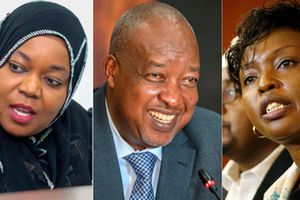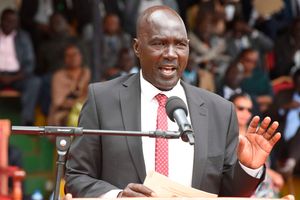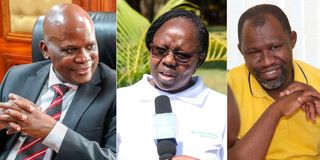
From left: Deputy Governors William Oduol (Siaya), Dr Yulita Mitei (Nandi) and Reuben Kamuri (Laikipia).
Deputy Governors, the deputy chief executive officers in counties who are in office based on election in a joint ticket with their boss, are facing their biggest tests yet.
As it is, out of the 47 counties, the Deputy Governors’ Caucus says up to 30 of their members have issues with their bosses —either in terms of public disagreements, forced to take a low profile politically, or have no defined duties and remain idle in office.
Stung by this, deputy governors are now pushing for changes in the law to secure their roles.
"Lack of clear roles for the office of the deputy governor is the main challenge facing deputy governors currently. The office of the deputy governor requires a clear definition of roles and responsibilities," Deputy Governors Caucus Chairperson Reuben Kamuri (Laikipia) told Sunday Nation in an exclusive interview.
"To cure this, there is a legislative memorandum before the Senate seeking to remedy the situation by amending Section 32(3) of the County Governments Act to provide for clear roles and compel governors to assign portfolios to their deputies. The issue at hand is about dignifying the office of the deputy governor," stated Mr Kamuri.
He further said, "Ensuring deputy governors are allocated clear duties by law is not about competing with governors but about ensuring there are clearly defined roles for them, so that there is uniformity, rather than a few working well with their bosses while the rest are side-lined."
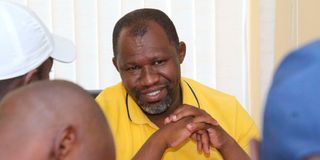
Deputy Governors Caucus Chairperson Reuben Kamuri.
In counties where deputy governors have no serious conflicts with their bosses, Mr Kamuri says, they are just "flower girls and paper boys," hardly seen in public or actively involved in county government activities.
In some county governments, deputy governors report to their offices but are given mundane tasks like attending burials or consoling bereaved families.
Most deputy governors have been forced to embrace a low profile and remain inactive to avoid conflict with their bosses.
Some county chiefs have not been delegating to their deputies for fear that they may take advantage to popularise themselves and possibly challenge them in future elections.
Examples of deputy governors who have had differences with their bosses include William Oduol (Siaya), Isaac Mutuma M'Ethingia (Meru), Philomena Bineah Kapkory (Trans Nzoia), James Gesami (Nyamira), and Engineer Fred Kirui (Kericho), among others.
Mr Mutuma is on Monday, March 17, expected to be sworn in as Meru governor following a High Court decision endorsing the impeachment of Ms Kawira Mwangaza last year.
Some of deputy governors who have assumed a low profile in what is seen as avoiding conflicts with their bosses include Nairobi's Njoroge Muchiri, Dr John Erus (Turkana), David Githanda (Kirinyaga), Dr Joseph Mahiri (Migori), Chirema Kombo (Kwale), Francis Thoya (Mombasa), Yualita Mitei (Nandi), Flora Chibule (Kilifi), and Christine Kilalo (Taita Taveta), among others.
But Council of Governors Chairman Ahmed Abdullahi says the proposed law should not be rushed.
He argues curing the bad blood between governors and their deputies requires some thought process and the need to balance a lot of interests.
“A lot of these are relationship issues. Can you legislate relationships? The role of the DG (Deputy Governor) is a replica of that of the DP (Deputy President) at the national level but in most of the counties, there are a lot of political intrigues that cause the bad blood,” Mr Abdullahi said.
He warns that the proposal risks creating two centres of power, if not handled carefully.
“I also expect people to be decent enough to respect the role of the DG, equally, the lacuna in the law causing problems is the business of DGs being party to impeachment of the governor so as to take over the role. The other risk with that move is to create two centres of power in counties” Mr Abdullahi, who is also the Wajir governor, said.
Other challenges faced by the deputy governors, according to Mr Kamuri, include instances where some deputy governors are denied resources and basic facilities—for instance, vehicles, or given vehicles with no facilitation for fuel—and cases where deputy governors' offices are understaffed, rendering them ineffective.
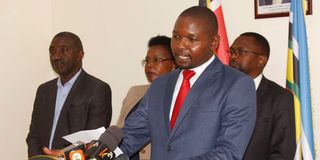
Meru Deputy Governor Isaac Mutuma during a press conference on November 9, 2022.
Others include disregard of pre-election pacts and lack of an operational budget for the deputy governor's office, preventing it from undertaking crucial duties.
The Laikipia Deputy Governor says that while he enjoys a good working relationship with his boss, Governor Joshua Irungu, the same cannot be said of other deputy governors, some of whom are not invited to County Executive Committee meetings, with their roles assigned to County Executive Committee members.
Most deputy governors have been idle for too long, and they are not happy about their sorry situation.
To fix this, they have demanded changes in the law that will give them reasonable powers in the devolved units.
They have tabled proposals to the County Governments Amendment Bill 2024, sponsored by Senate Deputy Speaker Kathuri Murungi, which is already before the Senate.
The Bill seeks to ensure deputy governors are allocated roles by law, backed by financial allocation so they can effectively discharge their mandate.
The deputy governors' caucus has proposed amendments to the Bill, requiring deputy governors to attend county executive committee meetings as a member, pursuant to Article 179(2) of the Constitution, and to be given at least three days’ notice of such meetings.
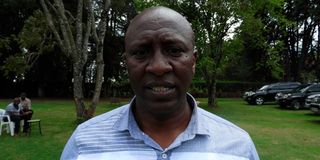
Kericho Deputy Governor Engineer Fred Kirui.
“We recommend that the deputy governor shall chair all county executive sub-committees, oversee the implementation of county executive committee resolutions across all departments in the county, and assist the governor in the coordination and supervision of departments,” further reads part of their proposals.
They are also seeking to oversee the County Government Service Delivery Unit responsible for implementing development projects.
Read: Revealed: 15 ultimate survivors in deputy governors purge and never-ending bid for defined roles
Additionally, they want to attend Summit, Inter-Budgetary Economic Council, and Sub-Committee meetings in the absence of the governor. They are also advocating for the coordination of disaster risk management, planning, and supervising disaster management and response within the county, as well as performing any other functions assigned by the governor.
Moreover, they want county governments to make necessary budgetary provisions for the proper functioning of the office of the deputy governor, including appointing a Chief Officer to manage the office’s affairs and assigning an accountant to manage the financial resources.
Siaya Deputy Governor William Oduol, whose working relationship with Governor James Orengo has been worsening, told the Sunday Nation that the law should be amended to avoid unnecessary fallouts in the future.
"The law was intended to promote teamwork, but as it stands, some deputy governors are locked out of county government management or given a cold shoulder in their workstations. Deputy Governors should also be given budgets, but it should be done in a way that does not make governors feel threatened," stated Mr Oduol, the vice chairman of the deputy governors' caucus.
Mr Oduol in June 2023 survived an impeachment after he was accused of gross violation of the Constitution and abuse of office. He was saved by the Senate, which failed to uphold the impeachment.
For the better part of the past two years, Mr Oduol has not been enjoying his allowances and requisite facilitation following a bitter fallout with Governor James Orengo. He is also blocked from attending executive committee meetings.
At some point, Mr Oduol claimed that Governor Orengo had used goons to lock his office, rendering it incapacitated and preventing him from executing his duties.
A deputy governor from a Rift Valley County, who asked to speak to us on condition of anonymity, has been sidelined by his boss for the past two years, leaving him idle at the office with no assigned duties.
To avoid boredom, he sometimes engages with residents. The fallout with the governor occurred within six months of their election in August 2022, reportedly due to the deputy’s demands for more involvement in governance and appointments.
This strained relationship has hindered service delivery.
He describes the situation as frustrating, with no participation in cabinet meetings or decision-making.
"I am just a deputy governor by name, but I am not actively involved in government at all. Why should I earn more than Sh600,000 for reading newspapers and taking tea? We are pushing for a change in the law to ensure the electorate gets value for their money," he said.


